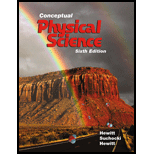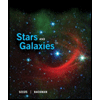
Pearson eText Conceptual Physical Science -- Instant Access (Pearson+)
6th Edition
ISBN: 9780134857107
Author: Paul Hewitt, John Suchocki
Publisher: PEARSON+
expand_more
expand_more
format_list_bulleted
Concept explainers
Question
Chapter 14, Problem 66E
To determine
The following box which containing liquid phase and why it can’t be conclude that box B represents lower temperature.
Expert Solution & Answer
Want to see the full answer?
Check out a sample textbook solution
Students have asked these similar questions
A piece of metal is placed on top of a 2.0 - kg wooden block (mass density = 562 kg/m³) piece. UseArchimedes' principle to calculate the mass (in kg) of copper if the top of the wood surface is exactly at thewater's surface?
A filmmaker wants to achieve an interesting visual effect by filming a scene through a converging lens with a
focal length of 50.0 m. The lens is placed betwen the camera and a horse, which canters toward the camera
at a constant speed of 7.9 m/s. The camera starts rolling when the horse is 36.0 m from the lens. Find the
average speed of the image of the horse (a) during the first 2.0 s after the camera starts rolling and (b)
during the following 2.0 s.
Answer the question (Physics)
Chapter 14 Solutions
Pearson eText Conceptual Physical Science -- Instant Access (Pearson+)
Ch. 14 - Prob. 1RCQCh. 14 - Prob. 2RCQCh. 14 - What pledge has been made by members of the...Ch. 14 - Prob. 4RCQCh. 14 - Prob. 5RCQCh. 14 - Prob. 6RCQCh. 14 - How are the particles in a solid arranged...Ch. 14 - How does the arrangement of particles in a gas...Ch. 14 - Which occupies the greatest volume: 1 g of ice, 1...Ch. 14 - What happens to the chemical identity of a...
Ch. 14 - What is a physical property?Ch. 14 - What doesnt change during a physical change?Ch. 14 - What is a chemical property.Ch. 14 - W hat is a chemical bond?Ch. 14 - What changes during a chemical reaction?Ch. 14 - Why is the freezing of water considered to be a...Ch. 14 - Prob. 17RCQCh. 14 - Why is the rusting of iron considered to be a...Ch. 14 - Prob. 19RCQCh. 14 - Prob. 20RCQCh. 14 - How many atoms are in a sulfur molecule that has...Ch. 14 - What is the difference between an element and a...Ch. 14 - How many atoms are there in one molecule of H3PO4?...Ch. 14 - What does the chemical formula of a substance tell...Ch. 14 - Prob. 25RCQCh. 14 - Prob. 26RCQCh. 14 - Prob. 27RCQCh. 14 - What is the chemical formula for the compound...Ch. 14 - Why are common names often used for chemical...Ch. 14 - How soon will nanotechnology give rise to...Ch. 14 - Prob. 31RCQCh. 14 - Who is the ultimate expert at nanotechnology?Ch. 14 - While visiting a foreign country, a...Ch. 14 - Of physics, chemistry, and biology, which science...Ch. 14 - Is chemistry the study of submicroscopic,...Ch. 14 - Prob. 47ECh. 14 - Prob. 48ECh. 14 - Which has stronger attractions among its...Ch. 14 - The leftmost diagram below shows the moving...Ch. 14 - The leftmost diagram below shows two phases of a...Ch. 14 - Prob. 52ECh. 14 - A skillet is lined with a thin layer of cooking...Ch. 14 - A cotton ball dipped in alcohol is wiped across a...Ch. 14 - Prob. 56ECh. 14 - Prob. 57ECh. 14 - Prob. 58ECh. 14 - Prob. 59ECh. 14 - Prob. 60ECh. 14 - Each night you measure your height just before...Ch. 14 - State whether each of the following is a physical...Ch. 14 - State whether each of the following is a physical...Ch. 14 - Classify each change as physical or chemical. Even...Ch. 14 - Classify each change as physical or chemical. Even...Ch. 14 - Prob. 66ECh. 14 - Is aging primarily an example of a physical or...Ch. 14 - Prob. 68ECh. 14 - Oxygen atoms are used to make water molecules....Ch. 14 - Oxygen, O2, is certainly good for you. Does it...Ch. 14 - Prob. 71ECh. 14 - If you eat metallic sodium or inhale chlorine gas,...Ch. 14 - Which of the following boxes contains only an...Ch. 14 - Prob. 74ECh. 14 - What is the chemical name for a compound with the...Ch. 14 - Prob. 76ECh. 14 - Prob. 77ECh. 14 - Prob. 78ECh. 14 - Prob. 79ECh. 14 - Prob. 80ECh. 14 - Medicines, such as pain relievers and...Ch. 14 - Your friend smells cinnamon coming from an...Ch. 14 - Chemistry is the study of (a) matter. (b)...Ch. 14 - The phase in which atoms and molecules no longer...Ch. 14 - Prob. 4RATCh. 14 - Based on the information given in the following...Ch. 14 - Prob. 6RATCh. 14 - Prob. 7RATCh. 14 - If you burn 50 g of wood and produce 10 g of ash,...Ch. 14 - If you have one molecule of TiO2, how many...Ch. 14 - Prob. 10RAT
Knowledge Booster
Learn more about
Need a deep-dive on the concept behind this application? Look no further. Learn more about this topic, physics and related others by exploring similar questions and additional content below.Similar questions
- Hi! I need help with these calculations for part i and part k for a physics Diffraction Lab. We used a slit width 0.4 mm to measure our pattern.arrow_forwardExamine the data and % error values in Data Table 3 where the angular displacement of the simple pendulum decreased but the mass of the pendulum bob and the length of the pendulum remained constant. Describe whether or not your data shows that the period of the pendulum depends on the angular displacement of the pendulum bob, to within a reasonable percent error.arrow_forwardIn addition to the anyalysis of the graph, show mathematically that the slope of that line is 2π/√g . Using the slope of your line calculate the value of g and compare it to 9.8.arrow_forward
- An object is placed 24.1 cm to the left of a diverging lens (f = -6.51 cm). A concave mirror (f= 14.8 cm) is placed 30.2 cm to the right of the lens to form an image of the first image formed by the lens. Find the final image distance, measured relative to the mirror. (b) Is the final image real or virtual? (c) Is the final image upright or inverted with respect to the original object?arrow_forwardConcept Simulation 26.4 provides the option of exploring the ray diagram that applies to this problem. The distance between an object and its image formed by a diverging lens is 5.90 cm. The focal length of the lens is -2.60 cm. Find (a) the image distance and (b) the object distance.arrow_forwardPls help ASAParrow_forward
arrow_back_ios
SEE MORE QUESTIONS
arrow_forward_ios
Recommended textbooks for you
 Principles of Physics: A Calculus-Based TextPhysicsISBN:9781133104261Author:Raymond A. Serway, John W. JewettPublisher:Cengage Learning
Principles of Physics: A Calculus-Based TextPhysicsISBN:9781133104261Author:Raymond A. Serway, John W. JewettPublisher:Cengage Learning An Introduction to Physical SciencePhysicsISBN:9781305079137Author:James Shipman, Jerry D. Wilson, Charles A. Higgins, Omar TorresPublisher:Cengage Learning
An Introduction to Physical SciencePhysicsISBN:9781305079137Author:James Shipman, Jerry D. Wilson, Charles A. Higgins, Omar TorresPublisher:Cengage Learning Stars and Galaxies (MindTap Course List)PhysicsISBN:9781337399944Author:Michael A. SeedsPublisher:Cengage Learning
Stars and Galaxies (MindTap Course List)PhysicsISBN:9781337399944Author:Michael A. SeedsPublisher:Cengage Learning University Physics Volume 3PhysicsISBN:9781938168185Author:William Moebs, Jeff SannyPublisher:OpenStax
University Physics Volume 3PhysicsISBN:9781938168185Author:William Moebs, Jeff SannyPublisher:OpenStax Modern PhysicsPhysicsISBN:9781111794378Author:Raymond A. Serway, Clement J. Moses, Curt A. MoyerPublisher:Cengage Learning
Modern PhysicsPhysicsISBN:9781111794378Author:Raymond A. Serway, Clement J. Moses, Curt A. MoyerPublisher:Cengage Learning Stars and GalaxiesPhysicsISBN:9781305120785Author:Michael A. Seeds, Dana BackmanPublisher:Cengage Learning
Stars and GalaxiesPhysicsISBN:9781305120785Author:Michael A. Seeds, Dana BackmanPublisher:Cengage Learning

Principles of Physics: A Calculus-Based Text
Physics
ISBN:9781133104261
Author:Raymond A. Serway, John W. Jewett
Publisher:Cengage Learning

An Introduction to Physical Science
Physics
ISBN:9781305079137
Author:James Shipman, Jerry D. Wilson, Charles A. Higgins, Omar Torres
Publisher:Cengage Learning

Stars and Galaxies (MindTap Course List)
Physics
ISBN:9781337399944
Author:Michael A. Seeds
Publisher:Cengage Learning

University Physics Volume 3
Physics
ISBN:9781938168185
Author:William Moebs, Jeff Sanny
Publisher:OpenStax

Modern Physics
Physics
ISBN:9781111794378
Author:Raymond A. Serway, Clement J. Moses, Curt A. Moyer
Publisher:Cengage Learning

Stars and Galaxies
Physics
ISBN:9781305120785
Author:Michael A. Seeds, Dana Backman
Publisher:Cengage Learning